 |
| Rainmakers, all: (Clockwise from bottom)
Polaris' Govind Singhal, Primentor's Phaneesh Murthy, and i-flex's
Rajesh Hukku |
The
newspapers labelled it one of Indian it's biggest deals. On November
7, India's pink brigade led with Wipro and TCS splitting an outsourcing
deal (valued at $70 million, Rs 336 crore annually) from Wall Street
firm Lehman Brothers. Infosys had been shortlisted, the reports
went, but lost out on the "sales" front. "Surely,"
whispered Infy-trackers, "the Infosys selling machine couldn't
be losing steam?" Some went far enough to attribute the loss
to the still-recent departure of the company's head of sales and
marketing, Phaneesh Murthy. Wicked, wicked, wicked. Actually, Infosys
doesn't seem to have lost steam. Its results for the three months
ended December 2002 show the addition of 23 new clients.
Still, the importance analysts at large give
to individuals like Murthy isn't entirely misplaced. He belongs
to an exclusive club of sales and marketing pros that keeps Indian
software's gravy train going. Meet the $10 billion (Rs 48,000 crore)
Indian software industry's rainmakers. Murthy's is a known name,
as is Wipro Technologies' Santa Clara-based CEO Vivek Paul's, and
i-flex's New Jersey-based CEO Rajesh Hukku's. Other names on the
list-compiled after extensive interviews with the companies themselves
some of which weren't sure whether they wanted to advertise their
dependence on individuals (apart from being uncomfortable about
naming clients and citing numbers), analysts, consultants, and head-hunters-are
downright obscure. Not too many readers would have head of Satyam
Computer's Ram Mynampati. Or Mphasis's Jeroen Tas. Even Rusi Brij,
CEO, Hexaware and a former marketing whiz at Satyam-he once went
in to negotiate a $2-million (Rs 9.6 crore) deal with an insurance
firm and walked out with a $20 million (Rs 96 crore) one-isn't exactly
famous.
That will change, says Sudha Kumar, CEO of
strategic marketing consultancy Prayag who was herself once part
of the famed Infosys selling machine as "more and more companies
start to be led by the sales and marketing function".
Relationships lie at the core of the business
of rainmaking. Hukku, for instance, is the man behind a several
million dollar, 100-country contract i-flex won from Citibank. "At
the end of the day," says he, "you are selling to a human
being and the deal is entirely based on his comfort level with you".
Make no mistake: rainmakers need to be backed
by efficient organisations and, more often than not, they are. "If
the company doesn't back my promise of delivery, my personal relationship
with the client becomes unsustainable," says Satyam's Mynampati.
In a move that could one day spell their own
obsolescence, many of these execs are engaged in the process of
institutionalising relationships. "The bigger you get, the
more you want to institutionalise the relationship," admits
Mphasis' Tas. Meanwhile, the business of rainmaking continues.
 The
CEO Rainmaker The
CEO Rainmaker
VIVEK PAUL/ Vice Chairman, Wipro, and CEO, Wipro Tech
From his base
in Santa Clara, California, Paul orchestrates Wipro's strategy:
he is widely perceived to be the man behind the Wipro-Ericsson deal.
Wipro acquired Ericsson's development centers in India-a logical
acquisition for a company with significant expertise in telecom
software-but not before Paul managed to wring out the commitment
of some consulting assignments from the telecom major. While the
actual deal-making and selling may be taken care of by others, and
while his association in them may merely be a CEO's, there is no
taking away from the fact that Paul's background-a MBA from the
Univ of Massachussets, stints at PepsiCo, Bain & Co, and notably,
GE-and location make him the ideal brand ambassador for Wipro Technologies.
Rainmaking is all about being able to front a deal, speak the same
language, business and cultural, as the customer and Paul's credentials
on both fronts are impeccable.
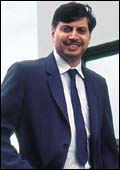 Marque
Seller, Selling Marque Marque
Seller, Selling Marque
PHANEESH MURTHY/ Founder, Primentor, & Former Head
(Worldwide Sales & Marketing), Infosys
Infosys historians-there
are several of the breed in Bangalore-will tell anyone who cares
to listen that if there was one deal that made the company, it was
the Nordstrom one. This was way back in 1994. Infy had yet to make
a mark on the global scene, and the deal with the US-based fashion
retailer gave it much-needed revenues and credibility. It also made
the man who struck the deal, Phaneesh Murthy, a legend of sorts
within the company. "It changed my life and the company's,''
says Murthy. ''It was the first business-critical deal we signed.''
Over the years, Infosys has pocketed some $20
million (Rs 96 crore) from Nordstorm in repeat business, not bad
going for a company whose average client bills $2.36 million (Rs
11.3 crore). The consummate rainmaker, Murthy attributes his success
to the ability to deliver, mostly outside the workplace, the "can't
ignore it" kind of advice to customers. Value accretive relationships
backed by knowledge and content, the man swears, are any day superior
to purely social ones. Today, the man who applied the airline industry's
yield-maximisation model to it services, offering differential pricing
to customers depending on the future commitments they were willing
to make, has tied up a year's business for his consulting venture
Primentor. Who knows what may have transpired had he heeded his
father's counsel and stayed back at Sonata Software instead of moving
to then unknown Infosys?
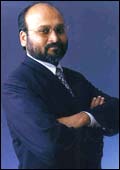 The
Method Player The
Method Player
GOVIND SINGHAL/ Executive Director, Polaris
The physics graduate
from Delhi Univ is a consummate planner-he had a hand in creating
Polaris' more structured-than-structured 28-step sales process-but
he isn't above admitting the role of the intangible in netting business.
"Relationship-building is a fine blend of art and science,"
he says, adding that several Requests for Proposal (RFPs) wouldn't
make it to the company were it not for relationships. A lead player
in Polaris' first big overseas deal-for Citicorp, circa 1997, and
it became the template for all subsequent deals-Singhal is now focused
on big-ticket deals that can help improve Polaris' average client
billing of $0.60 million (Rs 2.9 crore), low by it industry standards.
More deals like the several million dollar one he helped close with
American insurance major AIG should help.
Star Catcher
RUSI BRIJ/ CEO, Hexaware
Even without the
$2-million (Rs 9.6 crore) deal that became a $20 million (Rs 96
crore) one, Brij would have been a shoo-in for this listing. He
was responsible for striking deals with GE, Tyco (yes, it was a
respectable name then), and several other large clients in his 11-year
stint at Satyam Computer. Now, he is leveraging relationships built
over a 20-year career in software to make Hexaware, "the best
player in two technology areas, PeopleSoft and Enterprise Application
Integration." Last year, Brij signed on Germany's Deutsche
Leasing as a long-term client, a deal whose initial value was Euro
22 million (Rs 101.7 crore). His run continues.
 Getting
There Getting
There
BASAB PRADHAN/ Worldwide Head Of Sales, Infosys
It's not easy
filling a company-legend's shoes, not when they come in Phaneesh
Murthy's size, but Pradhan, a former HLL employee with the requisite
IIT-IIM background is doing just fine. Analysts admit that while
he may not be as aggressive as Murthy he seems possessed of greater
intellectual depth. "He is a good thinker," says a co-worker,
"and has the ability to look at the big picture unlike most
sales people who live for the here and now". An old America-hand,
Pradhan now drives Infosys' sales initiatives in over 30 countries
and played a part in a recent big win (Chairman and Chief Mentor
Narayana Murthy pitched in too), Aon Insurance. And yes, he plays
golf. "Deals are often sealed on the greens," laughs Pradhan.
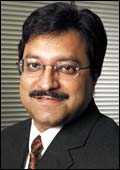 Network
Neighbour Network
Neighbour
SUDIP NANDY/ Head (Europe), Wipro Technologies
The last deal
this 44-year-old initiated was over beer at a weekend barbecue in
London. Valued in the low teens ($12-14 million), the deal is likely
to be finalised soon-and all because Nandy networked with a stranger
over beer. Of that, networking, that is, the man promises to do
more; he invests time in cricket matches, formula races, polo, and
is learning to play golf-he has discovered a passion for it, and
more importantly, four-to-five important execs at important customers
play the game. "You need to know your sports to do well in
it," jokes Nandy who, along with CEO Vivek Paul, worked on
the $70-million (Rs 336 crore) order Wipro bagged from British utility
Lattice. While he is all for creating occasions to build relationships,
Nandy admits that there is a need to invest in building the Wipro
brand in Europe. For the record, Nandy receives at least two calls
from headhunters every week.
Organised Seller
JEROEN TAS/Vice Chairman, Mphasis BFL Group
His Dutch roots
may have helped Mphasis bag one of its first big accounts, that
of Dutch bank ABN-Amro in 1999, and he admits that the deal that
made the company-JP Morgan Chase-was initiated "director-to-director"
but Tas likes to think beyond his Rolodex. His logic: personal relationships
may be crucial at take-off, but over time, the market forces companies
to look beyond them. "The more the brand stands on its own,"
he says, "the less important personal relationships become."
So, the 38-year-old Tas is currently engaged in making the 30-people
strong sales and marketing function at Mphasis, more process- than
individual-oriented. But he will continue to personally interact
with the company's biggest clients-JP Morgan Chase, Charles Schwab,
HSBC, and Citigroup.
 The
Quiet Stranger The
Quiet Stranger
SRINJAY SENGUPTA/ Regional Manager & Associate VP
(Europe Sales), Infosys
Infosys' European
sales operation is headed by a man who fits in well with the continent's
down-stated business culture that discourages strident, overt selling
of the kind its ally across the Altantic seems to prefer. The move
seems to have worked for Infosys-Sengupta was responsible for bagging
a prestigious order from retailer Sainsbury and has managed a five-year-old
relationship with Belgium's Proximus Belgacom Mobile, which has
seen the company emerge one of Infosys' top clients. Sengupta spends
between 30 per cent and 40 per cent of his time on clients-"hunting"
for new ones, and "farming" existing ones in his own words.
The former P&G-pro has a two-P maxim to crack difficult deals,
persistence and perseverance. "It is very easy to give up,"
he says. "You need to be internally tough.'' Clearly, Sengupta
is all that.
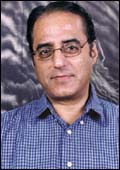 A
Passion For The Business A
Passion For The Business
RAJ SIROHI/ President & CEO, HCL Technologies,
America
Sirohi is the
master of the two-minute advertorial, the kind of spiel one gets
to give CEOs, COOs, CFOs, or CIOs of prospective clients at chance
encounters-a quick greeting, a firm shake of the hand, the delivery
of the 120-second pitch that impresses the prospect with the speaker's
knowledge of the industry and sets the ground for a business meeting.
That requires knowledge of companies and the industries in which
they operate, something Sirohi looks for in his team-members. "We
look for discipline in our front-line teams," he says. "People
need to do their homework diligently."
The discipline to understand companies, verticals,
and pain-points, issues of concern for every company. It was by
identifying the pain-point of time-to-market that Sirohi recently
struck a $20-million (Rs 96 core) deal with a billing solutions
company in the US. And he recently spearheaded the sales effort
to strike a $12-million (Rs 57.6 crore) deal with a US lottery company.
The client wanted to find a company that could run all its operations
on proprietary software backed by seven support centres across the
world. "We did a business study and sold them the idea of imploding
the number of support centres from seven to three," says Sirohi.
"One of them will be in India.''
But don't write the man off as a selling machine
sans emotion: Sirohi believes his edge comes from a passion for
the job. And so, he plays golf, follows the NFL, sits through tennis
tournaments, and sells, sells, sells. Some of that urge to, well,
sell, comes from a belief that a salesperson is only as good as
his last quarter.
Street-Smart Vendor
RAJESH HUKKU/Chairman & Managing Director,
i-flex
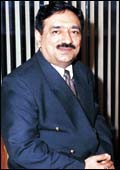 The
one-time trainee programmer at Tata Consultancy Services now heads
one of the world's most respected (and one of India's hottest) banking
and financial services software products company. The
one-time trainee programmer at Tata Consultancy Services now heads
one of the world's most respected (and one of India's hottest) banking
and financial services software products company.
Hukku is keenly aware of the power of relationships
in the software business. Repeat business accounts for more than
50 per cent of i-flex's revenues- Hukku himself sold one of the
company's products, Microbanker, to HDFC Bank in 1995, and has since
managed to convince the bank to become the first buyer of Flexcube
(a newer i-flex product), and i-flex's internet banking solution.
"If the first contract with HDFC Bank was for x," gushes
Hukku, "we have sold them products worth Rs 16x over seven
years.''
Hukku also front-ended i-flex's recent 100-country,
$100-million (Rs 480 crore) deal with Citibank-it was two-and-a-half
years in the making and had its beginnings in a chance meeting Hukku
had with a Citi exec at a seminar.
Hukku's rainmaking extends beyond merely landing
new business. As CEO, it is his job to stay on the right side of
industry analysts such as the Gartners, the IDCs, and the Gigas
of the world. "You could be capable of constructing the Taj
Mahal, but if they don't know about it, it's of no use." Thanks
to him, they do.
In his 44th year, Hukku has finally taken to
golf, a game most other rainmakers featured in this article swear
by. ''I won't need to work too hard on it,'' he says. "After
all, you are supposed to lose to clients.''
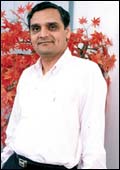 The
Organisation Man The
Organisation Man
RAM MYNAMPATI/ Vice President & COO, Satyam
His first love
quotient is very high," says an associate of Ram Mynampati.
Great first impressions are only to be expected of a man who spends
10 hours preparing for a one-hour meeting. Mynampati may believe
in the power of the CMM certification (issued by Carnegie Mellon
Univ's Software Engineering Institute and Satyam has the highest
rating, Level 5), or the opinion of independent research firms like
Gartner in swinging deals, but admits that ultimately all these
are just add-ons to the real selling process, one that is largely
driven by word-of-mouth. Still, Mynampati believes relationships
can only be as good as the quality of delivery. Thus, the relationship
may be individualised, but "the individual represents an organisation".
The mixture of the hard and the soft seems to be working for Mynampati-he
spends close to 80 per cent of his time with clients, existing and
prospective. In late 2002, Satyam bagged a large offshore contract
from a US company that shortlisted 28 companies at the first stage,
and two, at the second. "We became their consultative partner,"
says Mynampati, who advised the prospect on best practices in vendor
selection. That must surely rank as a first.
|

